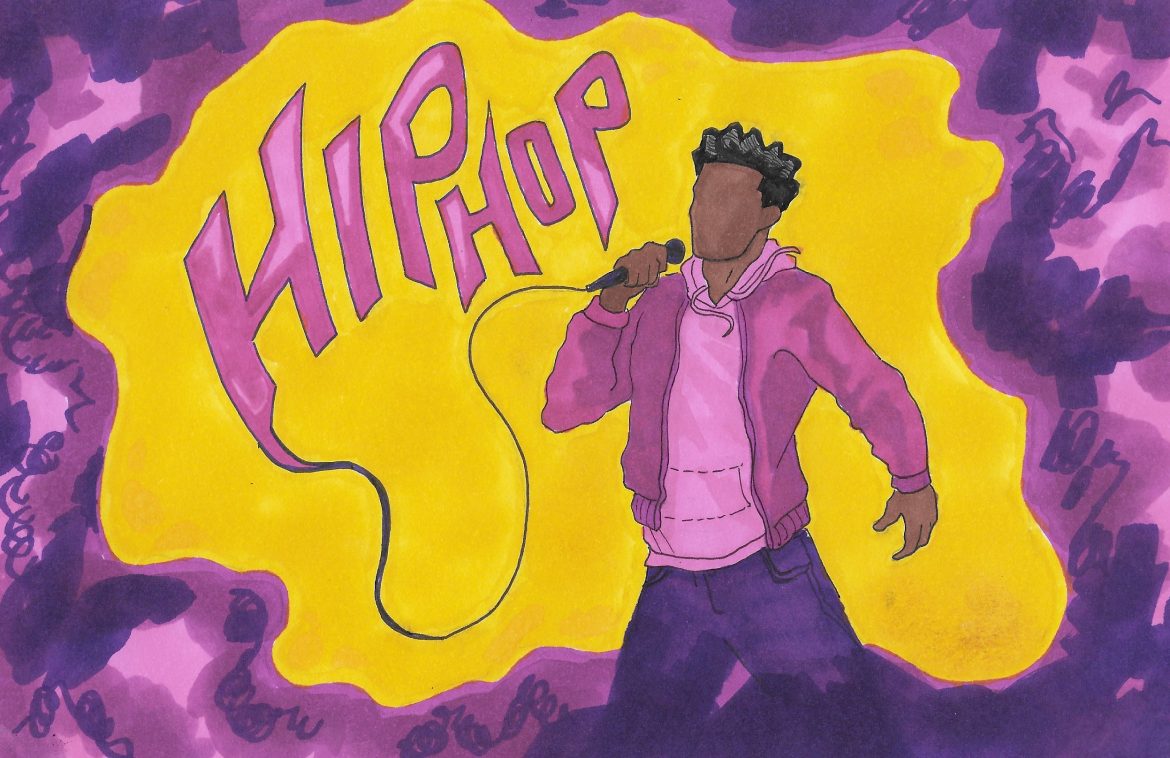A local Athens artist is depicted rapping into a microphone. The Ambassador of the Athens HipHop Community Montu Miller believes that hip-hop is more than just music. “There’s people like me that truly believe and know that hip hop is our culture. So there’s more to it than just the music. It’s a way of life,” Miller said. “So (hip-hop has) these two different things. Some people don’t understand the difference between them, and some do, so that’s why there’s such a cultural significance when you’re dealing with people like me that deal with hip hop as a culture because it is (a) cultural snippet.” Illustration by Lilli Sams
Athens is commonly known for its flourishing music scene of alternative and rock bands. However, with the exclusion of other genres such as hip hop and rap, this scene fails to truly represent and embrace the unique culture and background of all Athens residents.
R.E.M, Widespread Panic and Neutral Milk Hotel are all names of chart-topping bands that were created and discovered in Athens. These successes are only part of the proof of the strong musical scene Athens holds.
Apart from all originating in Athens, these bands all have one thing in common: their alternative styles. For years, many have referred to Athens as a hub for rock and alternative music, excluding various other existing genres.
In Bronx, NY in the 1970s, various races and cultures, including African Americans, Latino Americans and Caribbean Americans unified in a single art and music movement that produced the genre that is known to us today as hip-hop. While this genre has increased in popularity throughout the years, to many, it is more than songs — it is an integral part of their culture.
“I was born in Hip-Hop, where, when I was growing up, (it) was just a part of our life. It was the way we dress, it was the way we talked, it was the way we walked, it was the way we just presented ourselves, it was the way we learned,” The Ambassador of the Athens HipHop Community Montu Miller said.
Miller has spent years advocating for more events and coverage of the hip-hop genre, currently working with ATHFactor Entertainment, a company dedicated to promoting local hip-hop and rap artists in the Athens community.
“When I first came to Athens in 2000, there was a lot of hip-hop going on, but not a lot downtown. Not a lot just being seen in the local media from Flagpole to Athens Banner-Herald,” Miller said. “So me and a bunch of hip-hoppers in town got together and were the driving force for getting hip-hop to be played more downtown, being more featured in local media and really trying to push it.”
Athens is not only home to the University of Georgia, but also to a diverse community that can be seen at the K-12 level. According to Online Athens, in the Clarke County School District alone, student enrollment is 49% Black, 24% Hispanic and 21% White.
The Athens music scene has established a specific alternative rock style that is publicized and played at local venues and events. However, if the Athens community is home to more than one type of culture, shouldn’t it cater to more than one style of music?
“However, if the Athens community is home to more than one type of culture, shouldn’t it cater to more than one style of music?”
“There’s a major demand for hip-hop in Athens. So, we got to get outside of thinking this is just R.E.M., (The) B-52’s, Drive-By Truckers, Pylon city. This is a city that has Ishues. This is a city that has Kxng Blanco and Caulfield. So the demand is there,” Miller said. “The performances that are going on in Athens should reflect the demand and what the people want.”
While this genre has become more accepted in various venues in downtown Athens and throughout local media throughout the years, there is still room for more representation in community news, music festivals and events.
“It’s culturally significant in Athens, because just like every other culture, whether it be the Latinx culture or the University (of Georgia) culture or indie rock (culture) or all the other numerous cultures that happen in Athens, we are also here,” Miller said. “We need to make sure that we get as much shine, we get as much attention as all the other cultures do, because we’re here and some of us live this life every day.”
